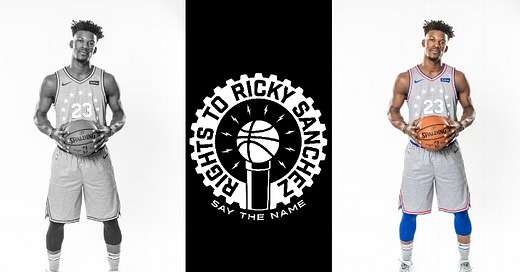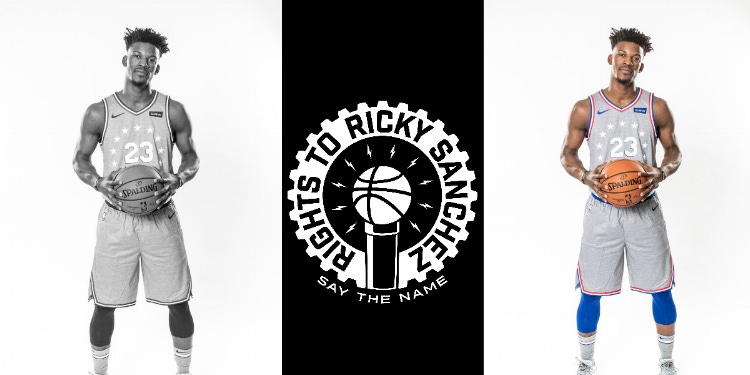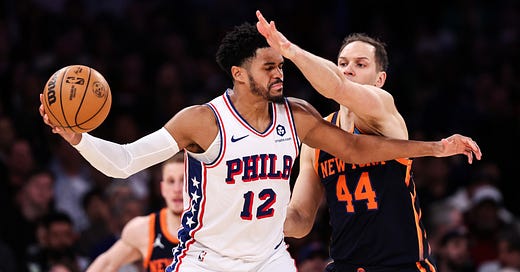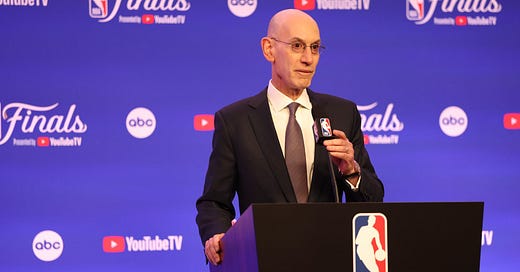
The Case Against Everything: The Jimmy Butler Trade
The case against Jimmy Butler.
Gotta Hear Both Sides is a place on Rights To Ricky Sanchez where James Beale crystalizes the two sides of a debate that we’ve been having, or should be having, on the podcast. James used to write about sports, once published a 5,000 word piece on Dionte Christmas, and his favorite all time 76er is George Lynch.
The Case for Jimmy Butler
The case for Jimmy Butler is pretty simple: he’s excellent at sports.
The defense is going to be absurd.
While his shot-creation in the half-court is getting most of the post-trade hype, the strongest argument for Butler is his defense. Not only is the four-time All Defense wing an excellent defender in a vacuum, but his strength, versatility, and on-ball defense all fit cleanly next to Embiid’s rim protection and Simmons’ elite instincts and ability to switch onto and credibly guard every position on the court. Quick guards have exposed the 76ers for the entirety of the year and a half they’ve been relevant again. With Butler that’s over. Even putting aside their offense, there isn’t a better defensive trio in the league than Butler, Simmons, and Embiid.
Further, the 76ers get to max out that defensive potential. No matter what you think about his offensive fit, Butler is not going to get played off the court on that end the way Rock did in the Celtics series. Health permitting, every night that matters, the 76ers are getting 100+ minutes of plus-plus defense from their three best offensive players. It’s going to feel like they have a goalie.
Unlike literally everyone else on the 76ers, Butler can shoot, dribble, and pass.
None of that is to diminish Jimmy’s offense. For five consecutive years, his usage and PER have both topped 20, and his true shooting has hovered around 58%. The 4.5 threes he’s taking this year are a jump, but the 38% clip he’s hitting them seems sustainable – Butler is shooting 39% on the catch-and-shoot 3s since the 16-17 season, a better % than Dario or Covington, and he’s going to see more playing next to the best pure passer he’s ever shared a court with. His shooting at the line is going to age well, too. He’s a plus offensive player on all-three levels, which is something the 76ers haven’t had in the Process era.
The cost was low
Finally, the cost. If you take feelings out of it – admittedly, not easy to do with the players they traded away – the 76ers gave up a one-position rotation guy best suited to have the ball in his hands, and a three-and-D wing who spent his one trip to the playoffs getting benched for TJ McConnell.
Saric and Covington are both plus players, but it would be a surprise if either made an all-star game, and a shock if they cracked an All-NBA team. Dario and Covington are like Toyota Hybrids. Butler is a Porsche.
The Case Against the Case for Jimmy Butler
The case for Jimmy Butler relies mostly on the inarguable fact that he’s good at basketball. What it largely ignores is how valuable that skill is, and whether it is worth is $90 million or $190 million.
Thanks to the Hinkie-special/resign-and-extend combination, barring injury, for the next four years Covington is going to be significantly underpaid – 538 projects him to outearn the remaining $45M on his contract by about $136M – and, thanks to the fact he came over when he did, Dario will be underpaid as well for at least the next two years of his rookie deal. It’s not crazy to think both of them offer more value on their deals than Butler will on his next one. In a league with limited cap space, having guys who are underpaid allows teams to overpay to fill out their roster, and the 76ers just traded two seriously underpaid players for the chance to pay market value for a third star.
Think about it this way: evening assuming Dario and Cov are Hybrids, those two at their contracts is like paying $12,000 for those $20,000 Hybrids. Jimmy at $190M? That’s more sticker price, even if it is for a Porsche.
Additionally, there is an opportunity cost. Butler is pretty good at all three levels, but he’s not the lights-out shooter that other rumored targets like Klay, George, Kawhi, or Beal would have been. We can debate the odds of the 76ers landing any of those guys, but with Jimmy in tow they just went from whatever you thought they were on Friday to ~0.
The Case Against Jimmy Butler
The case against the trade is pretty straightforward as well: The 76ers traded two loveable guys on super-cheap deals for an aging jerk.
Butler may be a jerk.
Respect is like air. As long as it’s present, nobody thinks about it. If you take it away, it’s a whole different story. Related: let’s ask Joel Embiid’s close friend Andrew Wiggins if this is a good deal.
Before the trade, the 76ers status quo was a young team that likes each other and is set up to compete for a half-decade. Their downside was Portland-East, a good team who might never be able to put the right guys around their core. The downside with Jimmy? That’s worse.
Jimmy Butler has publicly clashed with every young player he’s ever played with. Now he’s playing on a young team with a star center with the biggest personality in the league and a star PG who rightfully expects the ball in his hands. Will Butler accept his role on a team where neither the fame or offense are going to run through him? History suggests no.
Despite rumors that Ben and Joel aren’t close, the 76ers have a locker room that has never had any major reported issues. Now, they’ve added a guy who has more public clashes with his teammates than everyone on the 76ers has had. It could go poorly.
He’s going to get expensive.
The risk isn’t just off-the-court either. Rose, Noah, and Deng - every other star Thibs has ever put through the minutes he’s put Butler through (at least 35 minutes per game each of the last six seasons) – have all fallen off sharply. Apparently playing ~one million minutes is bad for your knees.
Now, Butler has made very clear that he puts a premium on respect, and on how he will act if he doesn’t feel he’s getting enough. Helpfully, Butler has been equally clear he equates respect with a 5-year $190M contract. I’m no Kevin Gnapoor, but 190 million seems like a lot of millions.
All of this means the 76ers have two options: 1. Pay Jimmy, and hope he ages better than literally every other star-level Thibs alum ever, or 2. Don’t pay Jimmy, and hope that this time, unlike every other time, he’s bluffing about causing problems if he doesn’t get the respect he thinks he’s earned.
Fit-wise, he’s a downgrade.
It’s not only important to have good pieces, you have to have the right pieces. You don’t want to end up trying to climb a mountain in a boat.
As ESPN’s Kirk Goldsberry noted, Butler’s effective field goal percentage is lower than either Dario’s or Covington’s, and he shoots about half as many of his shots from 3 as those two did, an important stat for a team already searching for floor spacing. Butler is great, but if he’s only great in the mid-post with the ball in his hands, suddenly the two stars the 76ers have in-house just got less effective on offense.
Bringing in Butler also means depth, already a weakness, will become a serious problem. After moving Covington and Dario, there is a robust debate on 76ers twitter about whether to start a rookie who was widely considered an overdraft with the 26th pick, or a veteran on a minutes limit whose old team had to include draft capital to get rid of. Buy-outs and additional trades may help address this lack of depth, but these weren’t necessary last week, and this week they are.
Worse, this depth issue is deepened because of what the trade means for Markelle. Trading for Butler means 1. The timeline is now, and 2. Fewer touches for everyone else. Those are two things sure to kill any remaining value Fultz had, either league-wide or specifically to the 76ers.
The Case Against the Case Against Jimmy Butler
The case against the case against Jimmy Butler is three-fold: First, from a slightly different perspective, he came cheap. The 76ers still have two lottery picks with upside, all of their picks, the Miami pick, and plenty of expiring contracts to match for trades. They also have playing time, cap exceptions to work with, and a chance to win to offer buy-out guys. They’re not done.
Second, it’s likely Butler is a better offensive fit that he might seem. Shot selection isn’t like height, and next to the best passer he’s ever played with at the NBA level and with a coach who is aware the 3 pt line exists, it’s plausible Butler starts taking more of those catch-and-shoot threes he hits so well.
Finally, maybe he’s right to be mad. John Harbaugh tells unhappy players “you can bitch all you want, as long as everybody can hear you. If you’ve got something you to want to change, make a case. If it makes the team better, we’ll do it.” This could be like that.
KAT doesn’t play defense. The Wiggins contract is bad. This is obviously bad news for Markelle, who sometimes looks like he’s a couple FTs away from pregnant women giving up their seats on the bus for him, but Embiid and Simmons are, right now, the two best players Butler has played with since Derrick Rose’s knees worked. Yes, Butler has never been happy, but he’s never really been in a situation where he should be, either.











